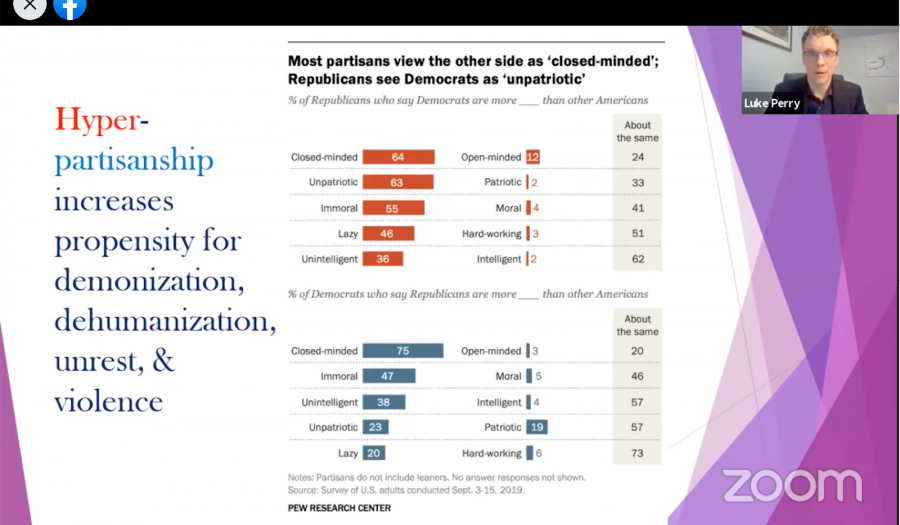The seventh talk on protest and democracy in the United States titled “The Impact of the Capitol Insurrection on the Modern Presidency and U.S. Elections,” took place on Feb. 11 and was presented by Luke Perry, professor of political science at Utica College.
About 35 people attended this talk via Zoom with more watching through Facebook Live. Throughout January and February, UC’s Center for Historical Research and History and Political Science departments hosted eight speaker events that focused on historical, political and legal themes to help contextualize what transpired to cause the Jan. 6 Capitol riots.
In order to understand how significant the riot was, Perry pointed back as far as 1608 to explain what slowly led to a two-party system and how that political system slowly divided.
Significant demographic change happened over the last several decades and there have been different normative views on immigration.
“Some view changing demographics of America as a source of improvement and strength for the country while others look at it as a liability and a sign of deterioration,” Perry said. “The status of America’s white majority is unraveling like never before and I think this is contributing to a social climate that is ripe for extremism and unrest and is one lens through which to help understand the Capital insurrection.”
Americans can better understand the paradox that happened between U.S. political ideals and historical experiences by examining three factors: the country’s framers and founders were a product of their environment and the times, compromising by keeping slavery was necessary to keep the union intact and people are motivated by power and money.
As the United States continued to grow and modernize, it adopted a somewhat conservative political culture, which includes examples such as individual freedom, constitutionalism and even limited government.
Moving forward to the present day, he said everything together shaped how the parties evolved and how their views came to be different.
Addressing the present-day situation, former President Donald Trump became forefront in the conversation due to the insurrection at the Capitol and the extremism that rose during his presidency. Hyper partisanship increases the propensity of demonization, dehumanization, unrest and violence.
Many who stormed the Capitol last month believed the election was stolen from Trump. According to Perry, most partisans view the other side as “closed-minded.” A majority of Republicans also view Democrats as “unpatriotic.”
Perry considers Trump “an infamously consequential president, which is kind of remarkable because usually, one-term presidencies are not that significant. Yet, Donald Trump will be remembered in U.S. presidential history, most notably for being impeached twice.”
After the presentation, History Professor Sherri Cash asked Perry how he would advise both parties, but Republicans in particular, on how to move forward since Republicans have a problem with extremism in the party.
“The best thing the Republicans could do is remove the extremist party protestors,” Perry said “However the Democrats are harder to revise since they have more of a unified front.”
Anyone interested in listening to the talk can view the recording on the Center for Historical Research’s Facebook page: https://www.facebook.com/chr.uc.


















![President Todd Pfannestiel poses with Jeremy Thurston chairperson Board of Trustees [left] and former chairperson Robert Brvenik [right] after accepting the university's institutional charter.](https://uticatangerine.com/wp-content/uploads/2023/10/unnamed.jpeg)






















































































































